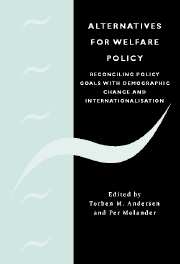Book contents
- Frontmatter
- Contents
- List of contributors
- Preface
- 1 Introduction
- 2 International integration and the welfare state
- 3 The changing age structure and the public sector
- 4 Emigration from the Scandinavian welfare states
- 5 Productivity and costs in public production of services
- 6 Use of fees in the provision of public services in OECD countries
- 7 Privatisation of social insurance with reference to Sweden
- 8 Occupational welfare
- 9 Pathways to retirement and retirement incentives in Sweden
- 10 Social insurance and redistribution
- 11 Assessing the effect of introducing welfare accounts in Sweden
- 12 Taxation in a global economy
- 13 Taxation and education investment in the tertiary sector
- 14 Debt strategies for Sweden and Europe
- 15 Policy options for reforming the welfare state
- Index
- References
6 - Use of fees in the provision of public services in OECD countries
Published online by Cambridge University Press: 22 September 2009
- Frontmatter
- Contents
- List of contributors
- Preface
- 1 Introduction
- 2 International integration and the welfare state
- 3 The changing age structure and the public sector
- 4 Emigration from the Scandinavian welfare states
- 5 Productivity and costs in public production of services
- 6 Use of fees in the provision of public services in OECD countries
- 7 Privatisation of social insurance with reference to Sweden
- 8 Occupational welfare
- 9 Pathways to retirement and retirement incentives in Sweden
- 10 Social insurance and redistribution
- 11 Assessing the effect of introducing welfare accounts in Sweden
- 12 Taxation in a global economy
- 13 Taxation and education investment in the tertiary sector
- 14 Debt strategies for Sweden and Europe
- 15 Policy options for reforming the welfare state
- Index
- References
Summary
Introduction
Reform of public services is never far from the agenda in any OECD country with debates often focusing on the level of spending that should be done publicly. This has led to different countries varying widely in the degree to which they rely on private spending through charges and insurance for many services.
A first indication of the variation across countries is demonstrated in figure 6.1, which gives the percentage of GDP spent on items such as fees and charges. This varies from negligible amounts in countries such as Turkey, Japan, Belgium and Spain to around 3.7 per cent in Norway and Poland and 5.3 per cent in Switzerland. In fact this figure only tells part of the story since the organisation of the delivery of public services in many countries is arranged in such a way that any private payment is not received by the state, but instead by a private sector institution delivering the service.
This chapter focuses on the methods of funding four services – higher education, health care, long-term care and child care – across OECD countries.
- Type
- Chapter
- Information
- Alternatives for Welfare PolicyCoping with Internationalisation and Demographic Change, pp. 131 - 166Publisher: Cambridge University PressPrint publication year: 2003
References
- 1
- Cited by



